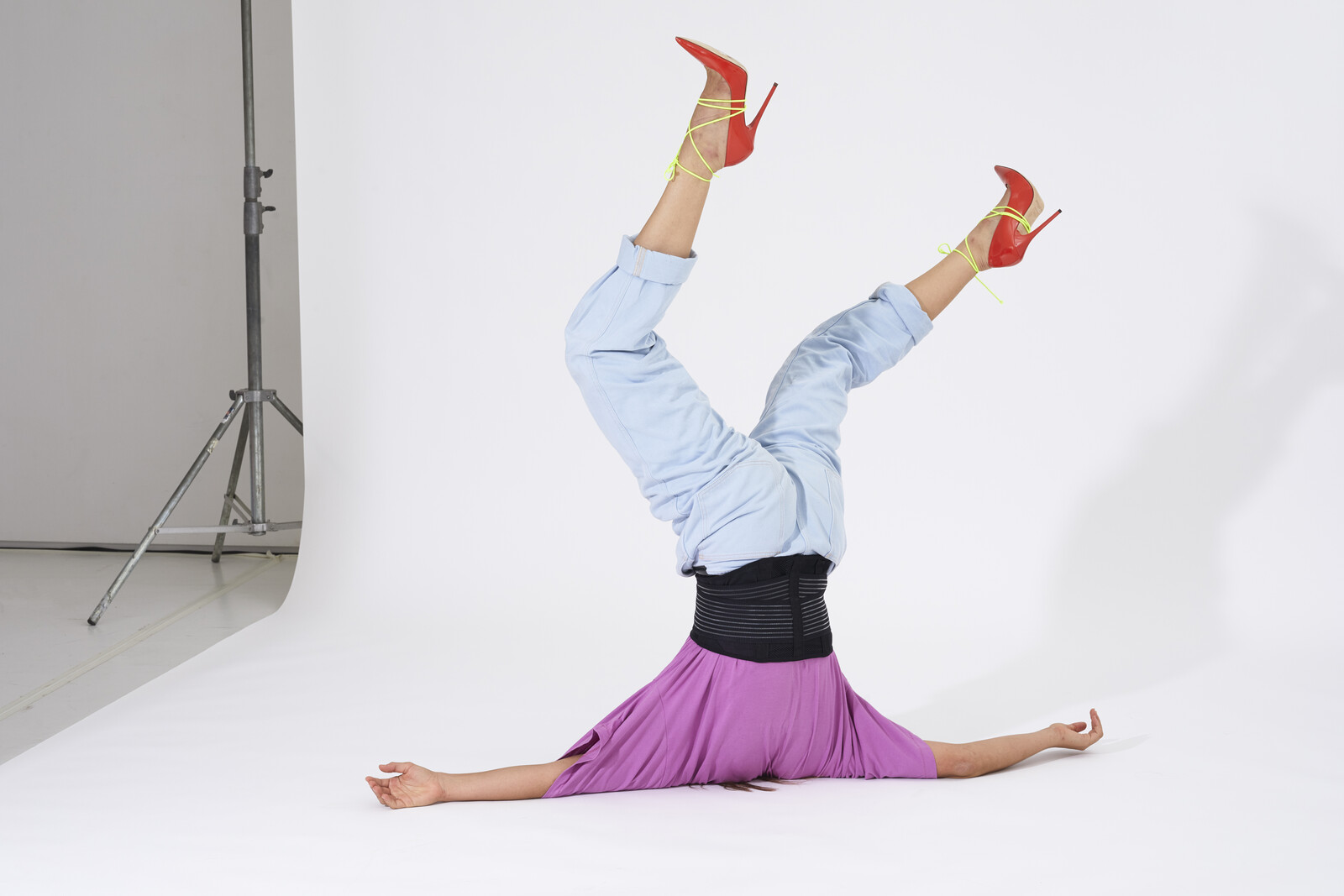An Ideal for Living
September 8–December 9, 2018
Bio Mimi Cry
September 8–October 21, 2018
Passe passe
October 27–December 9, 2018
38 rue des Francs-Bourgeois
75003 Paris
France
T +33 1 42 71 44 50
ccs@ccsparis.com
Alexandra Bachzetsis is developing a piece that cuts across the boundaries between dance, performance art, visual arts and theater. It makes use of the body as an artistic and critical apparatus, a locus of transformation and experimentation and a means of communication. Bachzetsis is fascinated by pop culture, which she considers at best evocative and seductive, at worst manipulative. And she draws amply on pop culture for gestures, movements and styles of dance, many of which are linked to specific musical genres, in order to express emotion.
An Ideal for Living, an exhibition specially conceived for Centre culturel suisse - Paris, forms part of her exploration of the subject of bodies over time, which has also given rise to a dance piece called Escape Act. Making use of various garments and accessories in a process of constructing imagination and desire, the artist explores ways in which bodies and objects are reversible. Bachzetsis draws inspiration from vogue culture—particularly as showcased in the 1991 documentary film Paris Is Burning—an urban dance style that emerged in Latino and African American transgender and gay communities, characterized by fashion poses and other codified movements.
Her exhibition comprises an installation of three simultaneous video projections in which a pair of teenagers, a boy and a girl with an uncanny resemblance, act out real-life situations and sing songs. The installation includes low platforms like mini-stages inviting exhibition-goers to strike poses or sing out loud, along with various gym equipment on which to warm up and shape up one’s body. It turns out that some of these objects, designed to protect against a danger or optimize certain physical exercises, are also liable to be used dangerously, even violently. This inherent ambiguity suggests the potentially subversive ambiguities of body language.
An artist’s book, published by Centre culturel suisse - Paris and designed by Julia Born, is also part of the exhibition. Stills of poses struck by the cast of Escape Act are juxtaposed with shots of ambiguous objects and arranged according to instructions to perform certain movements. Two contributions by Paul B. Preciado sow further confusion: a prose piece propounding a philosophical approach to movement and a poem conceived of as an encyclopedia of contemporary sexual subjectivity, derived from a human brain and artificial intelligence.
Alexandra Bachzetsis choreographs pieces for the theater and for exhibition spaces. As part of her exhibition at Centre culturel suisse - Paris she is going to stage a special version of her upcoming show Escape Act, featuring Sotiris Vasiliou and Owen Ridley-DeMonick. The performance will take place during the opening on Friday, September 7, at 6pm.
Based in Zürich, Bachzetsis began choreographing in 2001 and has created and staged over 25 pieces to date at various international venues. She has also shown her works at a number of museums (Kunsthalle, Basel (2008); Stedelijk Museum, Amsterdam (2013 and 2015); Museo Jumex, Mexico City; Tate Modern, London (2014); MoMA, New York (2017)) and international exhibitions (5th Berlin Biennale (2008); documenta 13, Kassel (2012); BIM, Geneva (2014); documenta 14, Athens and Kassel (2017)). In 2018 she won the Kunstpreis of the City of Zürich and began teaching at HEAD, the Geneva School of Art and Design. Her dance piece Escape Act will be presented at the PACT Zollverein in Essen on October 19, 2018, and various other venues, including the Centre Pompidou, in 2019. She works with the galleries Kurimanzutto in Mexico City and Meyer Riegger in Berlin and Karlsruhe.
Concurrent show in the room overlooking the courtyard:
Shirin Yousefi Bio Mimi Cry
September 8–October 21
The CCS is pleased to present Shirin Yousefi’s first institutional solo show. Yousefi was born in 1986 in Tehran and is now based in Lausanne. Her works tend to elude the viewer’s gaze, concealing themselves in the morphology of the surrounding space and seeking interaction with that ambient environment and the viewer. Often impalpable and volatile, sometimes incorporating intangible components such as smell or sound, they approach political, social and cultural issues through metaphor. Following up on her research into geopolitical borders (Tales of the Cortex, 2017) and the connections between reality and performance (F57, 2018), Shirin Yousefi is working for the CCS on a project on the history of koolbars, people who for centuries have made their living carrying all sorts of goods on their backs across the borders of Iraq, Iran and Turkey. As most of them are Kurds from Kurdistan, they have family on both sides of these borders. Yousefi’s exhibition addresses aspects of the human condition, particularly through the concepts of clothing and shelter, the relationship between man, animal and carrier, within the context of globalized trade and widespread political unrest. This new exhibit will consist of a sculpture, a sound installation, scents, and text-based murals.
Shirin Yousefi won the Kadist – Kunsthalle Zürich Production Award in 2017.
Gina Proenza Passe passe
October 26–December 9
The CCS will also be holding the first institutional show of works by Gina Proenza (b. 1994 in Bogotá, based in Lausanne and Paris). Proenza’s work is based on narratives that combine anthropological research, ancestral tales and legends, and literary influences, particularly South American authors such as Borges, Bioy Casares and Bolaño. She is interested in tongues, whether it be languages, such as dialects devised by ethnic groups to evade surveillance systems in Colombia, or the bodily organs themselves, which she molds and includes in sculptures that evoke gargoyles and stylized mouths. Her CCS project will be the fourth chapter in a series of exhibitions, a bit like an anthology of short stories. Each exhibition focuses on a specific geographical, cultural and linguistic context in a different part of Latin America.
Gina Proenza won the Helvetia Art Prize in 2018.
All exhibitions are curated by CCS director Olivier Kaeser.



